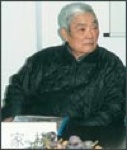
Liao, a Hong Kong journalist, came to Beijing as one of the overseas guests at Beijing University invited by the CCP Central Committee Liaison Department (中联办), and was among a delegation who met with by Vice President Zeng Qinghong (曾庆红) at the Sept. 30 National Day banquet.
Holding the hands of Liao and Cai, a former journalist also from Hong Kong, He Jiadong asked them to pass on a message to Zeng Qinghong, and to the Central Committee: “Don’t start a war! Don’t shoot the people! The Communist Party shouldn’t fight the Communist Party! Zhao Ziyang (˵µÁ¥´Èò≥) and Hu Yaobang (ËÉ°ËÄÄÈǶ) are both Party members, why were they struck down?” These were the words spoken from deep down in the heart of the 83-year-old first generation revolutionary who joined the Eighth Route Army (ÂÖ´Ë∑ØÂÜõ) at age 15.
“The Chinese who are armed shouldn’t fight the Chinese who are also armed, but I also want to say armed Chinese don’t shoot the Chinese who aren’t armed.” When Liu Yuan (ÂàòÊ∫ê), a senior official with the Chinese armed police, visited him, He said to Liu: “You are an army officer, don’t shoot the common people any more, please don’t shoot our own people, OK?”
He also asked to relay his message to the Chinese leadership that we need to learn about tolerance and reconciliation, not retaliation. He said: We may not hasten to redress June 4th, we may not bring up ‘punishing Li Peng (ÊÉ©ÂäûÊùéÈπè),’ which means revenge and He doesn’t favor. But he suggested to reinstate the reputation of the Tiananmen victims, and recognize their citizenship, instead of labeling them as rioters. “What’s the point for leaders to create a lot of baggage over themselves? Don’t make trouble for yourself,” He said.
“Let historians write the history and let history make judgement on everything. Don’t ever again use military force or violence against the common people. The judgement on Deng Xiaoping (ÈÇìÂ∞èÂπ≥) shall also be handed over to history. About June 4th, it’s fair to say that leaders made a wrong move at a special period of time in a special circumstance.”
“Now we shall advocate the spirit of reconciliation of the whole society. Who is wrong? Everybody is, and history will make its thorough judgement, and there is no need to fight for historical roles now.”
“My days are numbered, and I haven’t made any contribution to the Party or the people. Please convey my message to the leaders: one-party rule is ok, but don’t practice single faction autocracy. During the Yan’an Rectification period (ª∂ÂÆâÊï¥È£é) when Wang Ming (ÁéãÊòé) and Bo Gu (ÂçöÂè§) were being criticized, Mao elected them into the Central Committee and gave them jobs, which was a show of tolerance and solidarity. That time was not single-faction rule, but the Cultural Revolution became the single-faction rule. Why didn’t we tolerate Hu Yaobang and Zhao Ziyang during the 1980s? Why did we abandon the tradition of tolerance, reconciliation and unity but instead resorted to single-faction autocracy? We must be determined to not strike against our friends, not beat up good Party members. We should learn that tolerance and reconciliation are more important than freedom, harmony is more important than democracy. Some in the leadership don’t like me, which I don’t have a choice about. The party is too diverse, with good people and bad people. But I still have hope for the Party, and for Zeng Qinghong.”
“Now Chinese people are not likely to revolt, but any form of military crackdown has no popular support. The CCP Central Committee should have this confidence and tolerance. Don’t be afraid of people talking, be open to allow people all to talk, and don’t crackdown on those who talk. The Party represents the people’s interests, why fear the people and shoot the people? Those who join the army or the police force are supposed to serve the people and die for the people, why fear being hit by the people? A few fists or a couple of bricks are nothing to fear. Don’t be a soldier or a policeman if you are afraid of being hit by the people. But it’s no good for those who are armed to shoot unarmed people.”
“The problem now is not about ‘bourgeois liberalization‘, but ‘proletarian liberalization (Êó†‰∫ßÈò∂Á∫ßËá™Áî±Âåñ)’. Nowadays government and propaganda agencies don’t operate by the book, this is an extreme state of liberalization. If there is a bit of bourgeois liberalization, people can still talk; but if it’s this kind of proletarian liberalization, there would be no way for people to talk. Freedom demands a tolerant environment, which is more important than freedom itself. When Hu Shi (ËÉ°ÈÄÇ) demanded freedom from Chiang Kai-shek (Ëí㉪ãÁü≥), he proposed that ‘tolerance is more important than freedom.'”
“Zeng Qinghong can do some work on this and reconcile with intellectuals. I have heard rumors about him but he hasn’t done much yet. My impression of him is not bad, but hope he can do more positive things. I am willing to vote for him, hope he has more confidence and will do more work.”
He nodded when he heard about Zeng’s publication of a book, while he was the minister of the Organizational Department of the Central Committee of the CCP (‰∏≠ÁªÑÈÉ®), entitled “China Investigation Report – a Study on the Conflicts Within the People (‰∏≠ÂõΩË∞ÉÊü•Êä•ÂëäÔºç‰∫∫Ê∞ëÂÜÖÈÉ®ÁüõÁõæÁöÑÁ†îÁ©∂),” which proposes caution against using force while solving internal conflicts among the people.
Read also Eulogy for Lin Mu and He Jiadong by Bao Tong on Radio Free Asia.







